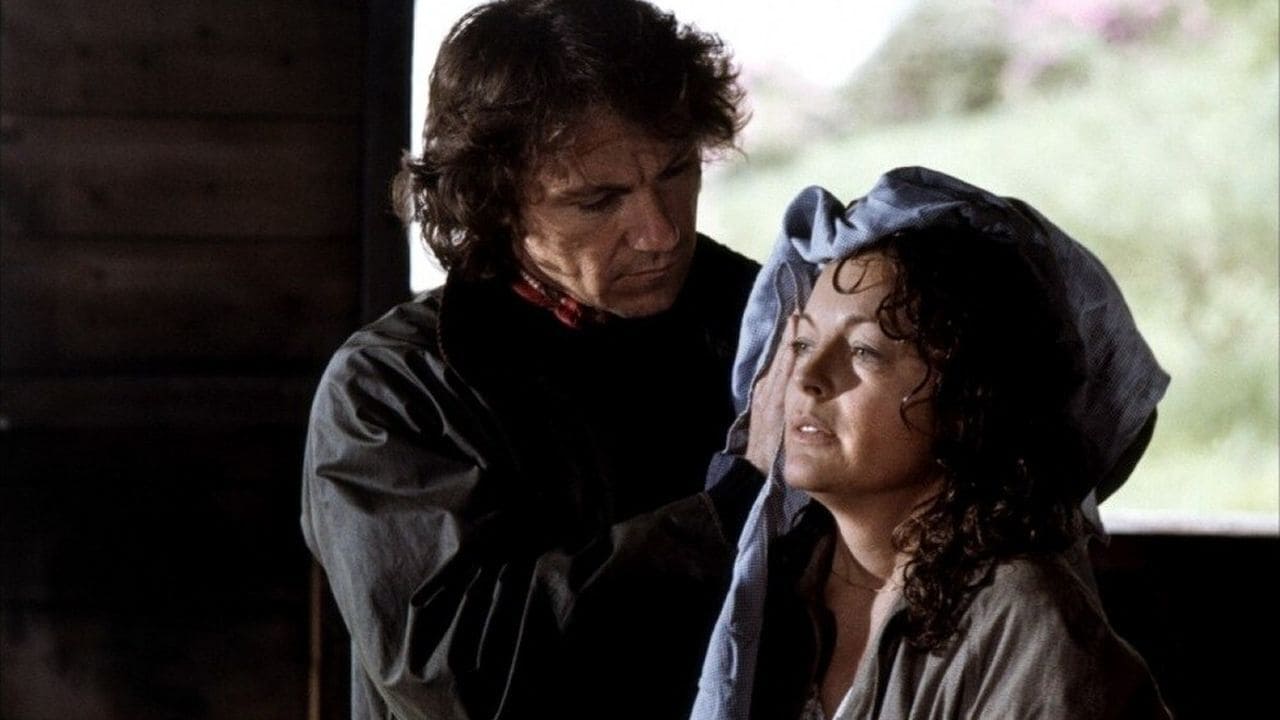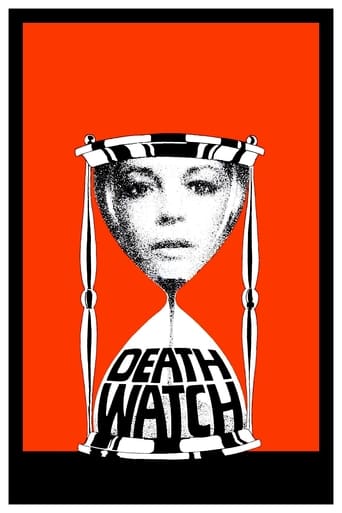

the audience applauded
... View MoreIt's fun, it's light, [but] it has a hard time when its tries to get heavy.
... View Morea film so unique, intoxicating and bizarre that it not only demands another viewing, but is also forgivable as a satirical comedy where the jokes eventually take the back seat.
... View MoreA film of deceptively outspoken contemporary relevance, this is cinema at its most alert, alarming and alive.
... View MoreThis is a relatively low budget sci-fi film set in what should be the distant future. And in this future, diseases have mostly been eliminated. However, it's strange that the entire picture looks like Britain circa 1980! It reminds me a bit of "Gattaca" where the astronauts are shown boarding the ship in black suits--presumably because space suits would have cost a lot! This is not a major problem...but a problem.In this futuristic world, folks are intrigued by any death that occurs to a young person...since they happen so infrequently. And, because of this, a sleazy TV show wants to follow someone as they die...because, as one of the execs says, "death is the new porn"! And, that person they've chosen (Romy Schneider) wants nothing to do with fame or money...she just wants to die in peace. And, she eventually flees to the poor part of town...where she can blend in and be anonymous. So, they use their newest invention to follow her surreptitiously...a camera embedded into a reporter's skull (Harvey Keitel). So, what he sees, the world sees as well.In some ways, the film is very prescient. After all, in this future, reality television is king...just like it is today. It's also a bit like watching "Network". But you can't help but think that for folks to be unfamiliar with death you'd THINK the world would have changed in some way...with newer styles of clothes, cars and buildings. I think this film is worth watching. However, I also think Bernard Tavernier's direction is, at times, rather slow...not bad but slow. And, at the end it becomes glacially slow!! Because of that, as well as the constricted affect of most of the actors (definitely NOT Keitel), the impact of the film is lessened and the film loses steam. Overall, good but not great.
... View MoreThe world is so infatuating, troubled and desperate that the only way we can care about it is to run away from our troubles by seeing others in distress, dying or getting killed by the thousands each day on the news or in fictionalized accounts as we get ourselves fed in what is called "entertainment". In the world of "Deathwatch", the latest advance in satisfying bored beings (won't call them human since most of them here are mere walking robots) is to follow a reality TV show whose main star is a terminal patient who is about to die at any moment. A show like this would be considered an outrageous act, a new low yet all sides of the issue whether being regular viewers or righteous souls opposed to it, they all watch it. Why? Because its too hard to kill curiosity. You may wonder how this managed to be presented? Well, we have Roddy (Harvey Keitel), a volunteer on a new experience where he has a camera implanted on his brain which records everything he sees, his eyes are the intrepid lenses who follow the poor Katherine (Romy Schnieder) recently diagnosed with an incurable disease. The filming of someone's downfall reflects in the escalating viewers numbers who are in it, trapped in this program, just waiting for the final hour. They want to be there, they wanna be present in those moments thinking they won't let her die alone. She'll have the company of millions. George Orwell's "1984", Aldous Huxley's "Brave New World" and Ray Bradbury's "Fahrenheit 451" all worked in giving us frightening visions of a future that already was somewhat happening in the time these authors were living. We're followed everywhere, there's pleasure everywhere, books are depressive and if you go against your rules there's punishment ahead waiting for you. I was almost waiting for "Deathwatch" to be a little like those examples (this is based on David Compton's novel), but it missed an authoritarian government to force people to watch it. But there's conflict, not only between idealisms (very reduced) but the one fought by Katherine and her choices since she doesn't want to be involved at all in this ludicrous spectacle worked on her back on her disgrace. Here starts many of the films confusing issues. It throws that mass consumerism and media are evil forces but it never gives them a proper face: the audience who watches the reality show all look simple people, compelled by the woman's tragedy; the master behind the curtains (Harry Dean Stanton) seems too good despite his ways of getting what he wants, always hiding himself from anything until he realizes there's no other way than show up and face the problem. We're never able to see who is sponsoring it; and why it's so important to present such thing.I'm not sure if the problem lies in the original source or in the way such was translated to the screen. All I know is that as long as it kept feeding me with ideas, new paths of thinking the unthinkable or the less shown on other films it kept me captivated, fully immersed in its story. Then the second half came in, proving to be sadly Hollywoodian and simplistic and disengaging. Luckily, the movie didn't mirrored its characters in the sense of us watching something dying slowly in front of our eyes. The final result is an interesting piece about mortality and how powerless humans are in face of many obstacles (and this is all sides of the issue, when it comes to Roddy's own problems while filming this project). Bertrand Tavernier makes an artistic, different and beautiful film over a delicate and rarely touched upon theme with efficiency which is death and everything surround it.Here's a quite innovative sci-fi film, more human, down to earth and less imaginative and technical as those films tend to be, "Deathwatch" is a thoughtful experience with pleasant and powerful performances by Schneider, Keitel and Max von Sydow playing Katherine's first husband. Satisfying despite its problems. 8/10
... View MoreSPOILERS!I was shown this film in a course called "Modernism & Modernity" in the Cinema Dep't at Binghamton University back in 1986 and have never forgotten it (thank you Prof. Walsh). I have gone on to use it in my own Media Studies high school class, for it is perhaps even a more relevant critique of a celebrity and "reality" obsessed screen culture today than it was when it was released in 1980. It also serves as a fine example of how the genre of science fiction need not rely on "futuristic" expensive locations and effects, for it is incredibly location-driven and the bleakness of the Scotland it was filmed in reflects its interior contemplations on the "progress" of humanity via technology. (In these ways, it reminds me of the recent "Children of Men" by Alfonso Cuaron.)The idea of video cameras being implanted in someone's eyes is brilliant and full of narrative possibilities. And unavoidable for us it seems. The portrayal of the reality TV show producer as being callous and only interested in ratings - with his firm belief that everyone/viewers have a "right to know" pushes the story into the opposites: "If everything is of interest, nothing is important", says the dying woman in a society where there is no natural death.Sight as knowing and the eyes as technology opens up many theoretical discussions, especially because of the Oedipal-like scene where Roddy blinds himself for "knowing" too much.... for his shame in that knowing, as if sight gives you knowledge. (Yet as Hitchcock showed us again and again, sight is unreliable.) Reading in another user's comment that the original film's story had Katherine's death a falsity set up by the producers in order to set their show in motion made me gasp, for that makes all of the film's meanings even more powerful and painful. Wow.This film may very well be the most memorable film I have ever seen and, yes, I agree with all the other comment-writers that it should indeed be brought into the light of day (WITHOUT "remaking" it!!!!!)
... View MoreI saw this film in May 1980, loved it, and immediately became a Harvey Keitel and Romy Schneider fan. I was shocked and saddened to read the next week in the newspaper that Romy Schneider had died suddenly. This was haunting -- especially since in this film she plays a woman who is dying and just wants to be left alone. Harvey Keitel plays a reporter working for a TV station who wants to up their ratings by filming raw drama. Harvey follows her, befriends her, and secretly films her on the run as she falls sicker and falls in love with Harvey. There are wonderful twists in the plot and technology ground breakers. Harvey has a camera lens implanted in his eye but the side effect is that he can never sleep. When I saw the Truman Show, it reminded me of this film from so long ago whose treatment of the subject matter (filming someone's life who is unaware of the fact) was such a new and exciting concept. Check this film out. You will not be disappointed!
... View More